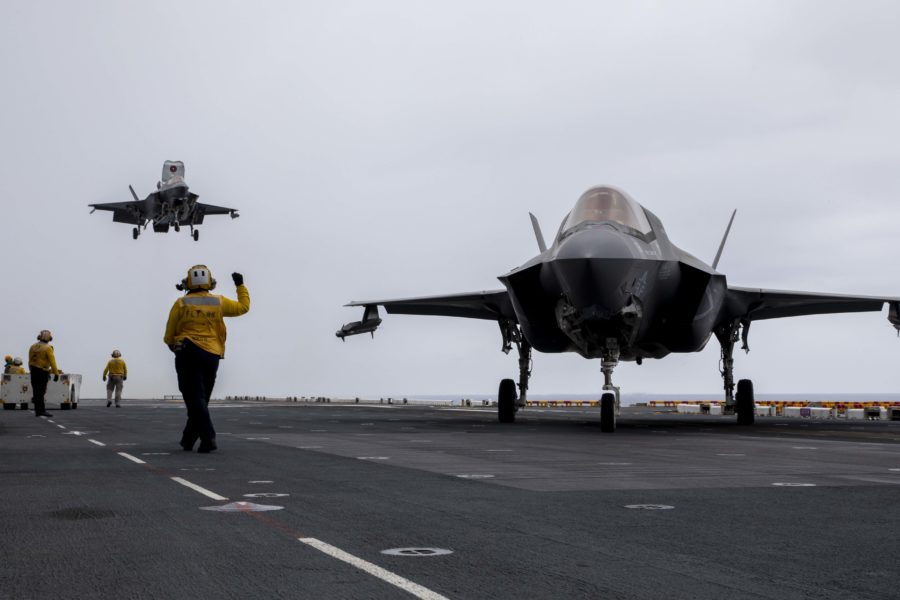U.S. officials expressed growing concern April 18 about the lack of communication between the Chinese and American militaries in light of increasingly aggressive actions by Beijing. It has now been nearly five months since Secretary of Defense Lloyd J. Austin III last spoke to his Chinese counterpart, despite a number of high-profile incidents involving the countries’ forces.
In written testimony to the House Armed Services Committee, principal deputy assistant secretary of defense for Indo-Pacific security affairs Jedidiah P. Royal said China had “a concerning lack of interest in the important lines of communication that underpin a stable defense relationship between our countries.”
In addition to Austin’s lack of communication with his Chinese counterpart, Secretary of State Antony Blinken’s planned trip to China—originally set for February—has been postponed indefinitely.
“There is clearly a high level of frustration with the lack of engagement from Beijing,” Zack Cooper, a China expert at the American Enterprise Institute, told Air & Space Forces Magazine.
In a November meeting with Chinese leader Xi Jinping, President Joe Biden underscored the importance of avoiding conflict and maintaining open lines of communication. And later that month, Austin met China’s then-Minister of National Defense Wei Fenghe in Cambodia.
But since then, attempts to contact high-level officials from the Chinese military after a Chinese intercept of U.S. Air Force RC-135 over the South China Sea and the U.S. shoot-down of a Chinese spy balloon have been rebuffed, U.S. officials said.
“The Department of Defense believes strongly in maintaining open lines of communication between Washington and Beijing to ensure competition does not veer into conflict,” Royal said. “Immediately after downing the [People’s Republic of China] high-altitude balloon in February, the Department submitted a request for a call between Secretary Austin and the PRC Minister of National Defense because we wanted to ensure there was no misunderstanding or miscalculation in Beijing about our actions. Unfortunately, the PRC declined our request. This was not far from the first time that the PRC has declined invitations to communicate from the Secretary, the Chairman of the Joint Chiefs of Staff, or other Department officials.”
China’s military, officially called the People’s Liberation Army or PLA, has also declined longstanding, lower-level requests from top regional U.S. military commanders to meet their military counterparts—requests that predate the latest incidents, officials said.
“I’ve had a standing ask to meet with the Eastern Theater commander and the Southern Theater commander from the PLA for my entire time in his job, and they have yet to accept it,” Adm. John C. Aquilino, the head of U.S. Indo-Pacific Command (INDOPACOM) since 2021, told lawmakers. ”The theme here is we continue to try to engage with our partner, but there’s a different opinion there.”
Experts noted that China views communications, or the lack thereof, between officials as strategic. China’s current unwillingness to engage in talks comes as it claims America is seeking to upend the status quo in Taiwan through arms sales to the island, Congressional engagements with Taiwanese leaders, and the Biden administration’s trade policy towards China.
The PLA has been more forceful in its activities around Taiwan since then-Speaker of the House Nancy Pelosi (D.-Calif.) visited the self-governing island in August 2022. After Taiwanese president Tsai Ing-wen met with current House Speaker Rep. Kevin McCarthy (R.-Calif.) and other lawmakers during an unofficial visit to the U.S. earlier this month, China staged aircraft carrier operations and live-fire military drills that practiced a blockade of Taiwan, which the Chinese government claims as a rebel province. U.S. officials have said the increased Chinese military activity around the island is the “new normal.”
In addition to China’s public actions, not talking to high-level American officials sends an implicit message of displeasure to Washington, experts said.
“I think that the Chinese are withholding dialogue from us in the hope that they will have some impact on our policies,” said Bonnie Glaser, a China expert at the German Marshall Fund of the United States. “I think they’re trying to get our attention. They’re going to have to decide at some point whether or not they want to engage.”
The U.S. says its interest in open military-to-military channels stems not from a desire to ligate policy but to avoid disaster. In late December, the U.S. claimed a PLA fighter came within 20 feet of a U.S. Air Force RC-135 in an “unsafe” maneuver. China has intercepted other U.S. military flights and allegedly harassed a vessel from the Philippines, a U.S. ally, with a high-powered laser.
“In just the past 12 months, PLA aircraft and maritime vessels have continued to conduct inherently risky intercepts against U.S., ally, and partner assets in the air and at sea, increasing the unacceptable danger of an accident,” Royal said in his testimony.
U.S. officials said it is ultimately in China’s interest to be on speaking terms with the U.S. if a serious incident occurs—a position echoed by regional security experts.
“They’re treating us like communications channels are only a favor to us, when in fact, it’s of mutual benefit,” said Patrick Cronin of the Hudson Institute. “There will be other surprises. When they precipitate a crisis, they better answer the phone, because the escalation will put the entire region at risk.”
